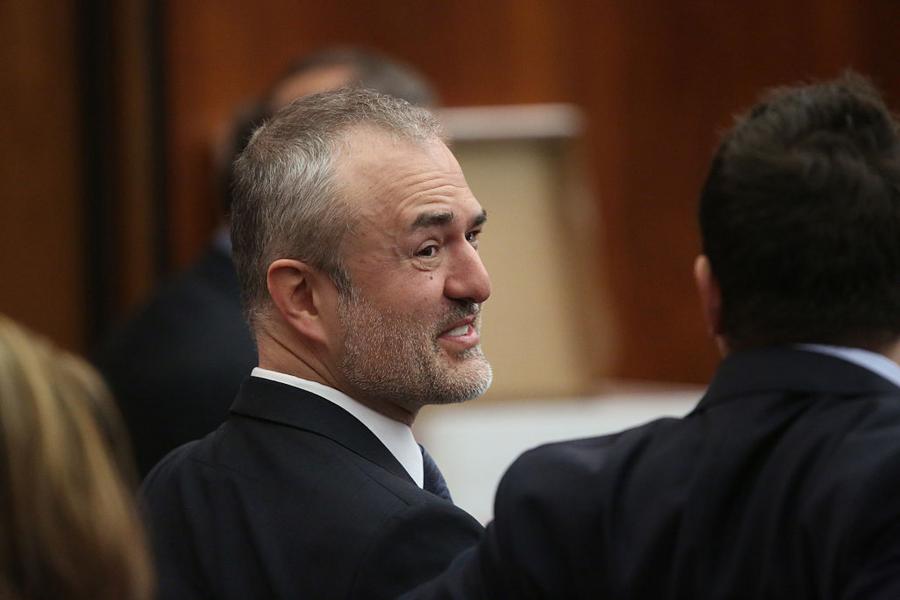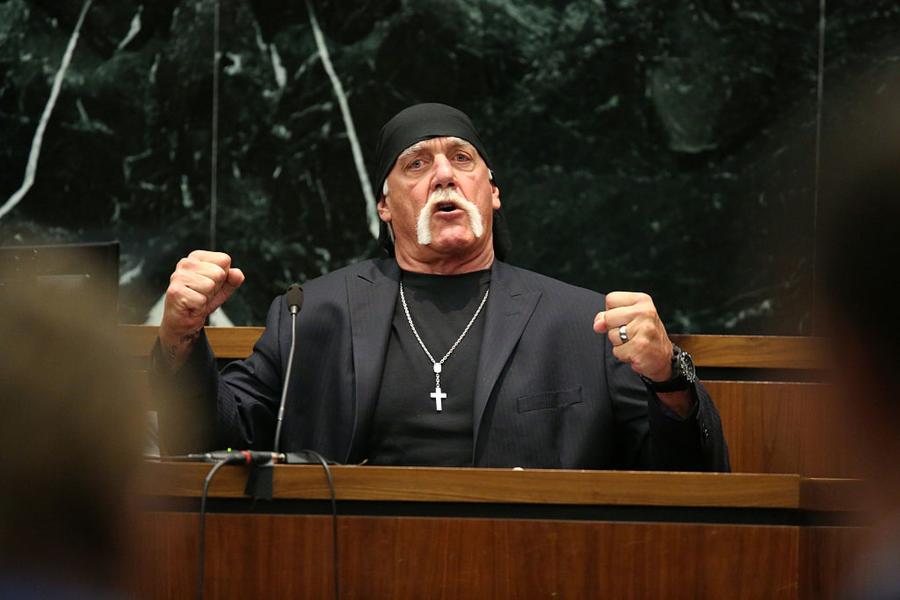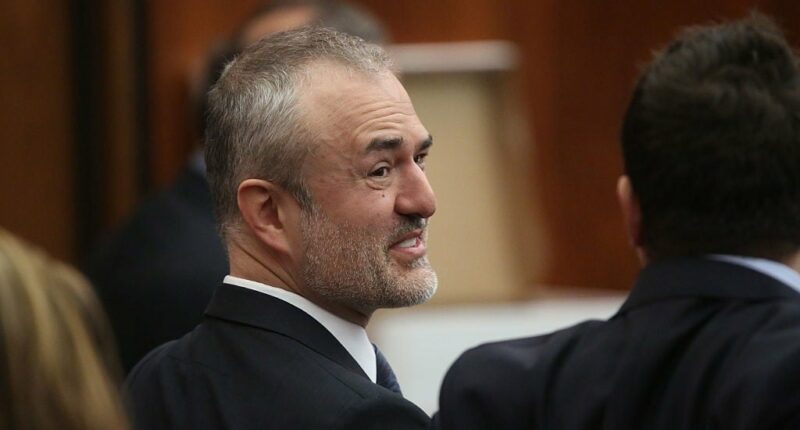For over a decade, Nick Denton’s Gawker Media fed the internet’s appetite for controversy. His digital media empire pulled back the curtain on celebrity image-making, exposed tech billionaires, mocked the powerful, and reveled in radical transparency. Gawker published leaked emails, sex tapes, and unflattering truths with equal glee. At its peak, it was among the most influential and feared forces in online media.
And then came Hulk Hogan.
The British-born, Oxford-educated journalist who once envisioned himself as the anti-Murdoch of the digital age saw his empire collapse under the weight of one of the most bizarre and consequential lawsuits in American media history. Bankrupted by a former pro wrestler, secretly targeted by a Silicon Valley billionaire, and forced to sell off his company piece by piece, Denton would emerge from the wreckage with his reputation in tatters—but surprisingly, with millions still in the bank.

John Pendygraft-Pool/Getty Images
From Financial Times to Gossip Titan
Nick Denton began his career at the Financial Times in the 1990s, reporting on finance and the emerging world of tech startups. In 1998, the paper sent him to San Francisco to cover the dot-com boom. Rather than just observe the internet revolution, Denton decided to join it. He co-founded two early tech sites, including the startup First Tuesday, and by 2000 had sold one of them for $50 million. He was, by any definition, a natural internet entrepreneur.
In 2002, working out of his Manhattan apartment, Denton launched Gawker.com, a snarky, gossip-driven blog aimed at the New York media elite. It quickly became a must-read for its biting tone and fearless attitude toward sacred cows. It published what others wouldn’t—and bragged about it.
As traffic soared, Denton expanded Gawker into a full-fledged media network. He launched or acquired blogs like:
- Gizmodo (tech)
- Lifehacker (productivity)
- Jezebel (feminism)
- Deadspin (sports)
- Kotaku (gaming)
- io9, Fleshbot, and others
Each site carried Gawker’s voice—unapologetic, unfiltered, and irreverent. Writers were encouraged to publish internal memos, leaked videos, private messages, and the occasional celebrity meltdown. Gawker wasn’t just ahead of the curve—it was the curve.
By the early 2010s, the network attracted tens of millions of readers each month. The company was reportedly valued at more than $400 million, and Denton’s 30% ownership stake made him, on paper, worth over $120 million.
The Stories That Made—and Unmade—Gawker
Gawker branded itself as the antidote to traditional media. It broke stories that major outlets were too cautious—or too polite—to touch. It published:
Its ethos: tell the truth, no matter how uncomfortable, and let the chips fall where they may.
“Nick’s intention was always to do what British newspapers had done forever,” former Gawker COO Gaby Darbyshire once said. “Shine a bright light on dark corners.“
But there were signs of overreach. In 2007, Gawker outed billionaire investor Peter Thiel as gay in an article titled “Peter Thiel is totally gay, people.” In 2015, the site published a controversial—and later retracted—story about a Condé Nast executive allegedly soliciting a male escort. Critics accused Gawker of crossing lines for clicks. Denton didn’t always disagree. But he also believed that Gawker was doing what the press was supposed to do: challenge power, not protect it.
Hulk Hogan Knocks Gawker and Denton Out
In 2006, Hulk Hogan slept with Heather Clem, the wife of Bubba the Love Sponge, a Florida shock jock and Hogan’s best friend. Unbeknownst to the wrestler, Bubba secretly hid a camera and microphone in the room to film the encounter. Hogan was not aware that he was being recorded and did not consent to having the tape released. But it was released. In October 2012, it was posted on Gawker.com despite pleas from Hogan’s legal team that the footage was taken without his permission.
When Gawker refused Hogan’s request to take the video down, he sued. What initially seemed like a celebrity privacy case soon took on massive legal and financial implications.
Unbeknownst to Denton, Hogan’s legal fees were being secretly paid by Peter Thiel, who had spent nearly a decade plotting revenge for his 2007 outing. Thiel bankrolled not only Hogan’s lawsuit but also other suits against Gawker as well.
In March 2016, a Florida jury awarded Hogan $140 million in damages—$115 million in compensatory damages and $25 million in punitive damages. Denton was personally liable for at least $10 million. It was a death sentence for the company.

John Pendygraft-Pool/Getty Images
Gawker’s $135 Million Sale
In June 2016, Gawker Media filed for bankruptcy due to its overwhelming legal debts. Two months later, Gawker Media was sold at auction for $135 million to Univision Communications, the Spanish-language media giant looking to expand its footprint in English-language digital publishing. The sale included nearly all of Gawker’s properties—Gizmodo, Jezebel, Deadspin, Lifehacker, Kotaku, io9, and others—but notably excluded Gawker.com, which was shut down permanently as part of the deal.
Nick Denton, who held an estimated 30% stake in Gawker Media at the time of the sale, reportedly walked away with $15.4 million.
The purchase was made through Univision’s newly formed Fusion Media Group, which absorbed Gawker Media’s assets and staff. Univision rebranded the surviving properties under the Gizmodo Media Group umbrella, and many of Gawker’s top editors stayed on—at least initially. However, over the next few years, editorial tensions, restructuring, and budget cuts eroded much of the original staff and spirit.
As for Gawker.com, the brand lay dormant for several years until it was briefly revived in 2021 by BDG (Bustle Digital Group), which had acquired the domain. That reboot was short-lived. In early 2023, Bumble, the dating app company, quietly acquired the Gawker domain as part of a broader brand repositioning strategy, though no editorial relaunch has followed.
- Meanwhile, most of Gawker Media’s former verticals have splintered or changed hands again:
- Gizmodo, Kotaku, and Jezebel passed from Univision to private equity firm Great Hill Partners in 2019 and now operate under G/O Media.
- Deadspin underwent a mass staff exodus in 2019 over editorial interference and has since struggled to recapture its former influence.
- Lifehacker continues to operate under G/O Media but with a completely new editorial team and tone.
Denton’s Bankruptcy & Hogan Settlement
Denton filed for personal bankruptcy on August 1, 2016. He listed approximately $150 million in liabilities, most of it tied to the Hogan judgment, and listed his key assets as his 30% Gawker stake and his Manhattan apartment. And if you recall from a moment ago, he earned a reported $15.4 million when Gawker Media was acquired.
In 2017, Denton and Hogan reached a confidential settlement that fully resolved the judgment. As part of the deal, Hogan dropped the $10 million in punitive damages against Denton. Denton also affirmed under oath that he had no involvement in leaking additional Hogan tapes to the press, a key clause in the agreement. We have no idea how much Hogan received from Denton. But just to reiterate, a year before the settlement, Nick received $15.4 million (pre-tax). Could one presume that Nick paid a good portion of his after-tax windfall to Hogan to bring the chapter to a close?
Here’s another point to consider: In 2004, Nick paid $1.9 million for a condo in New York. He did not sell that condo to pay his debts. He did put it up for rent in May 2016 for $15,000 per month, but he actually continued to own this home until 2025. He listed it in March 2025 for $3.5 million and sold it in June 2025 for $4.3 million.
Legacy
Nick Denton’s rise and fall marked a defining chapter in the evolution of online media. Gawker Media helped pioneer the modern blog format, weaponized traffic-driven journalism, and reshaped the rules of celebrity and tech reporting. It also sparked one of the most consequential debates in the history of the First Amendment: what happens when freedom of the press collides with the privacy of public figures—and the resources of billionaires.
That debate remains unresolved.
Denton himself largely retreated from public life after the Hogan settlement, but the ripple effects of his downfall continued. Peter Thiel, the secret backer of the Hogan lawsuit and architect of Gawker’s demise, emerged with his reputation as a fierce and calculating power player intact. He went on to deepen his involvement in conservative political causes and build out his business empire. As of 2025, Thiel’s net worth is estimated at $23 billion, thanks largely to his longtime stake in Palantir Technologies, the data analytics firm he co-founded that now services major government and defense contracts.
Hulk Hogan, the man at the center of the scandal that brought down Gawker, passed away on July 24, 2025, at the age of 71 from cardiac arrest. While many remember him as a wrestling legend, his name also became attached to one of the most shocking courtroom victories in media history.
As for Gawker, what remains is mostly digital dust. Its content survives in screenshots and archives. Its style—snarky, fast, fearless—has been absorbed, rebranded, and sanitized by newer outlets. The brand itself has changed hands multiple times, but its soul never quite made the journey.
Denton may no longer be a mogul, but his influence is undeniable. Gawker showed how the internet could democratize journalism—and how quickly that ideal could unravel when it ran up against money, ego, and the courts.




